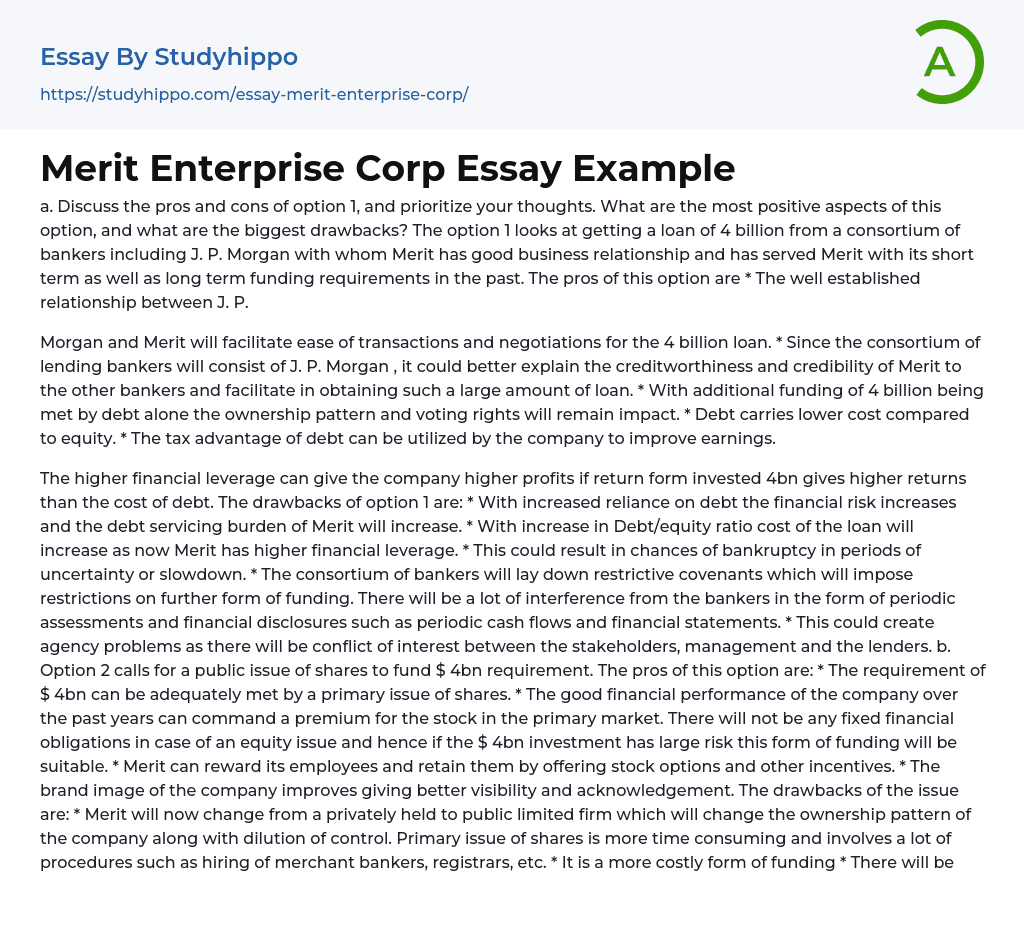Start of text:
a.
unified text:
a.
The text below provides a discussion on the pros and cons of option 1, while giving importance to personal opinions. It also focuses on the positive aspects and main drawbacks of this option. Option 1 involves obtaining a loan of 4 billion from a group of bankers, especially J.P. Morgan, with whom Merit has a strong business relationship. This bank has previously provided funding for both short-term and long-term purposes, making it advantageous to select this option because of the well-established connection with J.P. Morgan.
J. P. Morgan and Merit will assist in making transactions and negotiations for the $4 billion loan easier. The presence of J. P. Morgan in the consortium of lending bankers will help explain Merit's creditworthiness and credibility to other bankers, thereby facilitating the acquisition of this subs
...tantial loan.
_x000D_
With an additional 4 billion in funding met solely by debt, the ownership pattern and voting rights will remain unaffected. Debt is a more cost-effective option compared to equity, and the company can utilize the tax advantage of debt to enhance earnings. The company can potentially achieve higher profits with increased financial leverage if the return on the invested 4bn exceeds the cost of debt. However, option 1 has its drawbacks. As reliance on debt increases, the financial risk and debt servicing burden of Merit will also increase. Additionally, with the increase in the Debt/Equity ratio, the cost of the loan will rise due to higher financial leverage for Merit._x000D_
* Uncertain or slow periods could potentially lead to bankruptcy. * A group of bankers will establish strict agreements that limit additional funding. The bankers will frequently evaluate and reques
financial information, such as periodic cash flows and financial statements. * This situation may result in agency problems due to conflicting interests among stakeholders, management, and lenders.
b. Option 2 proposes a public share issue as a means to raise the required $4bn. The advantages of this option are as follows: * The primary share issue can sufficiently fulfill the $4bn requirement. * The company's strong financial performance in recent years can result in a premium valuation for the stock in the primary market. In the case of high risk associated with the $4bn investment, this form of funding is appropriate as it does not involve fixed financial obligations. * Stock options and other incentives can be utilized by Merit to reward and retain its employees.
The company's brand image improves, providing better visibility and acknowledgment. However, there are drawbacks to this issue. Firstly, Merit will change from a privately held to a public limited firm, altering the ownership pattern and diluting control. Additionally, issuing primary shares is a time-consuming process that involves numerous procedures such as hiring merchant bankers and registrars. It is also a more expensive form of funding, requiring higher disclosures as a listed company. Furthermore, there will be increased regulations imposed by regulators like the SEC and stock exchanges. Lastly, since the stock will be traded in the secondary market, there is the potential for significant investments by individuals or institutions.
Which option should Sara recommend to the board? I believe Sara should recommend option 2 because:
- The company's growth trajectory may require continuous funding, which cannot be solely met through retained earnings and debt. Thus, issuing equity would be a wise decision to
consider future needs.
Today, we find ourselves in a global market where competition extends beyond local peers to international players. Consequently, going public offers numerous advantages such as improved visibility, enhanced brand image, a wider investor base, and greater recognition.
- Commercial Bank essays
- Debit Card essays
- Deposit Account essays
- Subprime Lending essays
- Bankruptcy essays
- Earnings essays
- Tata Group essays
- S corporation essays
- Secretary essays
- Premise essays
- Perfect Competition essays
- Underwriting essays
- Synergy essays
- Valuation essays
- Bank essays
- Banking essays
- Corporate Finance essays
- Credit Card essays
- Currency essays
- Debt essays
- Donation essays
- Enron Scandal essays
- Equity essays
- Financial Accounting essays
- Financial Crisis essays
- Financial News essays
- Financial Ratios essays
- Financial Services essays
- Forecasting essays
- Foreign Exchange Market essays
- Free Market essays
- Gold essays
- Investment essays
- Legacy essays
- Loan essays
- Market Segmentation essays
- Money essays
- Personal finance essays
- Purchasing essays
- Retirement essays
- Shareholder essays
- Stock Market essays
- Supply And Demand essays
- Venture Capital essays
- 12 Angry Men essays
- A beautiful mind essays
- A Separation essays
- Alfred Hitchcock essays
- American Beauty essays
- American Films essays




